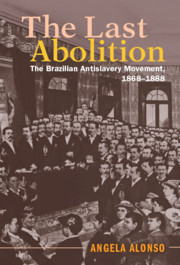Book contents
- The Last Abolition
- Afro-Latin America
- The Last Abolition
- Copyright page
- Dedication
- Contents
- Figures
- Maps
- Tables
- Acknowledgments
- Abbreviations
- Introduction
- 1 Elite Abolitionism
- 2 Pro-Slavery Rhetoric
- 3 The Moral Repertoire of Abolitionism
- 4 The Theatricalization of Politics
- 5 Expansion
- 6 Results-Based Abolitionism
- 7 Votes: A Movement/Government Alliance
- 8 Bullets: Movement and Countermovement
- 9 The March to Victory
- 10 Future of the Preterite
- 11 Abolitionism as a Social Movement
- Annex
- Bibliography
- Index
Introduction
Published online by Cambridge University Press: 24 September 2021
- The Last Abolition
- Afro-Latin America
- The Last Abolition
- Copyright page
- Dedication
- Contents
- Figures
- Maps
- Tables
- Acknowledgments
- Abbreviations
- Introduction
- 1 Elite Abolitionism
- 2 Pro-Slavery Rhetoric
- 3 The Moral Repertoire of Abolitionism
- 4 The Theatricalization of Politics
- 5 Expansion
- 6 Results-Based Abolitionism
- 7 Votes: A Movement/Government Alliance
- 8 Bullets: Movement and Countermovement
- 9 The March to Victory
- 10 Future of the Preterite
- 11 Abolitionism as a Social Movement
- Annex
- Bibliography
- Index
Summary
This book, based on a dataset with 2,214 abolitionist events, makes the case that the campaign for the abolition of slavery in Brazil was a structured and lasting network of activists, associations, and public demonstrations, a national social movement. In this sense, this study shows civil society mobilization was not a particular feature of Anglo-American abolitionism.The Brazilian abolitionist movement's actions are explained here from a relational perspective, focusing on its contentious relations – in the public space and inside political institutions – with governments as well as with a pro-slavery countermovement. Besides, the book places Brazil in a global history of abolitionist movements, showing how local activists hooked onto the global abolitionist network and appropriated the repertoire of contention – rhetoric, strategies, and political performances – put together by previous anti-slavery movements. Brazilians adapted this repertoire to local political tradition. Given the formal link between church and State in Brazil, abolitionists preferred secular rhetoric and theater to propaganda. In this sense, it was more modern than the somewhat religiously embedded Anglo-Saxon abolitionism.
Keywords
- Type
- Chapter
- Information
- The Last AbolitionThe Brazilian Antislavery Movement, 1868–1888, pp. 1 - 23Publisher: Cambridge University PressPrint publication year: 2021



